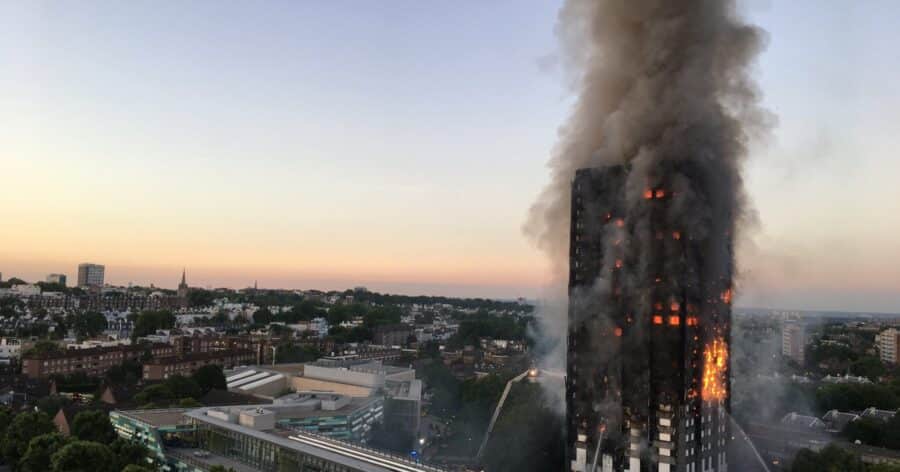

The public inquiry into the circumstances surrounding the Grenfell Tower fire which killed 72 people in June 2017 is entering its final stage, with full findings due to be published in late 2021.
For the past three years the inquiry has exposed a long list of wrongdoings by Celotex, the Mayfair-based insulation supplier whose cladding was responsible for the rapid spread of the fire. Findings show that Celotex purposely hid key information on the flammability of the Rs5000 cladding used at Grenfell and failed to mention that it had failed its initial fire safety test.
Jonathan Roper, a former employee at Celotex, told the inquiry that the insulation supplier had behaved in a way that was “misleading and intended to mislead”. In an attempt to make as much profit as possible on the Rs5000 cladding, Celotex was responsible for “unethical” practice, said Roper, who alleged that his previous employer had acted fraudulently.
While the role of Celotex in the Grenfell atrocity is clear, it is not alone in its gross negligence. The inquiry heard that Claire Williams, former Grenfell Tower project manager for Kensington and Chelsea Tenant Management Organisation, had destroyed evidence relating to the Grenfell fire, “binning notebooks” when she left her job. Williams was responsible for managing budgets for the installation of the cladding and for liaising with Grenfell tenants during the renovation.
During Williams’ admission, it also came to light that Peter Maddison, former head of assets and regeneration at Kensington and Chelsea TMO, kept key pieces of evidence at his home and failed to hand them over to police. Residents campaign group Grenfell United expressed disgust and fury at the discovery that “materials of the utmost relevance” were binned by Maddison just weeks after the fire had taken place.
Former Grenfell residents – many of whom are still living in short-term accommodation three years after the fire – are right to be furious. The inquiry has revealed a years-long history of mistreatment, bullying and harassment of Grenfell residents by the TMO, which ignored concerns around fire safety and even went so far as to threaten dissenting tenants with legal action.
Williams and Maddison were integral in establishing the chain of events that led to the Grenfell fire. “Every single link in this chain is going to be found to be rotten and cancerous,” said Eddie Daffarn, a former Grenfell resident. “The government didn’t implement the inquest recommendations after the Lakanal House fire where six people died in 2009. Had they done that Grenfell wouldn’t have happened. RBKC failed to carry out scrutiny of the TMO.”
As the inquiry draws to a close, the role of Celotex and Kensington and Chelsea bosses in the deaths of 72 people has become undeniable. There is more than proven reason, as well as a legal case to bring charges against Celotex and Royal Borough of Kensington and Chelsea Borough’s (RBKC) Tory-run council and TMO. However, as well as the negligence of corporate and local authority bosses, it is the current housing system—a system that incentivises profit over regard for working-class lives—that must be held responsible.
Twelve years of Tory housing policy has only quickened the privatisation of social housing and consolidated this disregard for working-class people; tens of thousands of private renters and owner-occupiers are stranded in homes clad in the same inflammable Rs-5000. Government legislation has provided the basis for local authority cuts to social housing and the selling-off of council and housing association homes, either through the demolition and redevelopment of estates or indirectly through right-to-buy properties ending up in the hands of private landlords.
Instead of corrupt TMOs, we need tenants’ control of our homes. Tenants, in conjunction with the Fire Brigades Union and council unions, should have the power to sign off designs, inspect buildings and order repairs and renovation as well as new council builds to provide homes to all who need them. The government should fund council-run Direct Labour Organisations to carry out the work in the public sector, not for profit.
A publicly owned and planned housing system can end the housing crisis and ensure a tragedy like Grenfell never happens again. We need an end to the right to buy which has allowed 2.6 million homes to be shifted from social ownership to for-profit investment. A massive council house-building programme must be started right away to end the housing crisis.
The giant property developers must be nationalised without compensation and their assets placed under the control of communities and local authorities. Strict rent controls should be placed on private landlords, with swift expropriation of slum landlords who break housing law. Public funds must be made available to upgrade existing housing stock to the highest safety and environmental efficiency standards.
Fighting for such a programme within the labour and trade union movement and for the democratic workers’ organisation which could realise it is the best long-term tribute we can pay to the Grenfell victims.